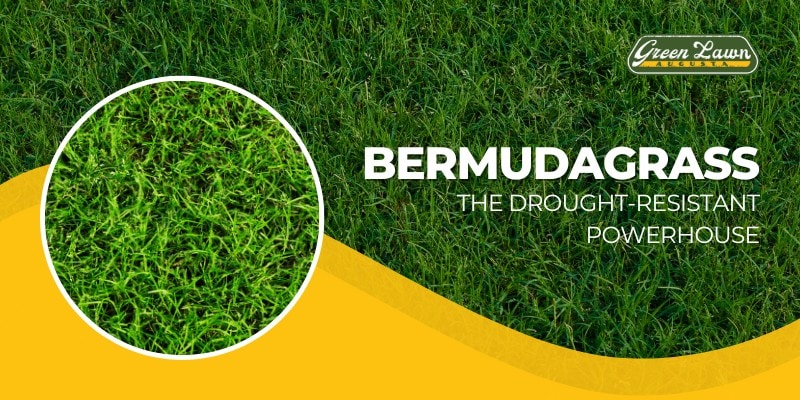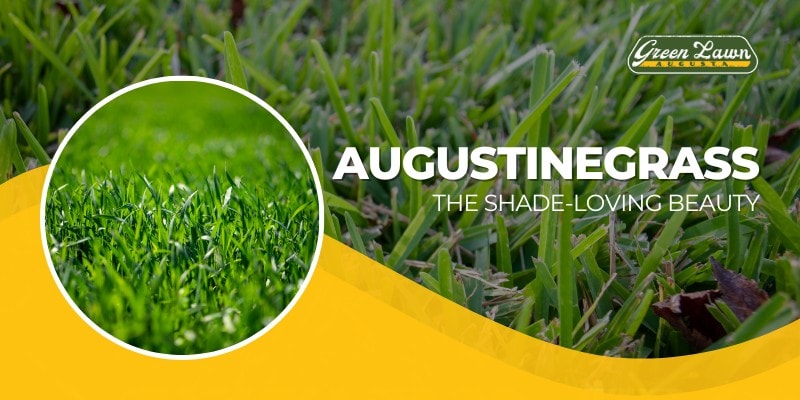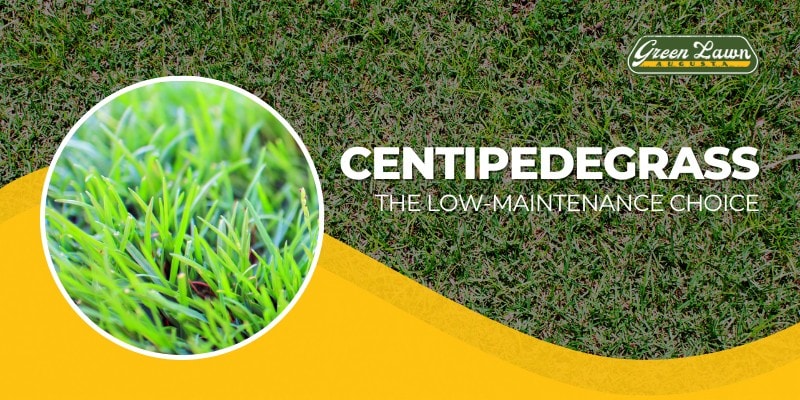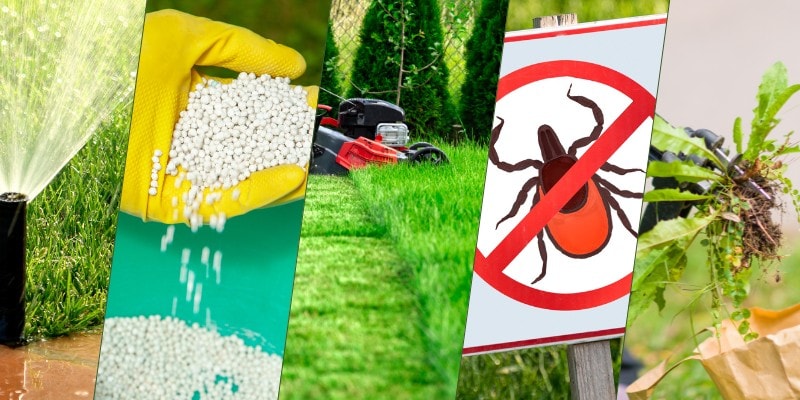The 6 best grass types for Augusta are warm season grasses. A beautiful lawn can make any home look luxurious and inviting. You don’t have to be a master gardener to achieve this! With the right grasses, you can create your oasis quickly.
In this article, we break down the climate and soil conditions, plus provide recommendations for the best warm- and cool-season grasses that will keep your lawn looking great all year round.
So grab your gardening gloves – it’s time to get growing!
Table of Contents
ToggleUnderstanding Augusta’s Climate and Soil Conditions

Understanding the climate and soil conditions is the key to having a lush, green lawn.
Warm-season grasses are essential for maximum summer growth, as they can tolerate heat and drought better than cool-season grasses.
Additionally, you’ll need to incorporate cool-season grasses into shady areas of your lawn, as they have greater shade tolerance than warm-season grasses.
The Importance of Warm-Season Grasses
Warmer months mean warm-season grasses thrive, creating a vibrant, thriving lawn. Choosing the right seed selection is important with soil preparation and drainage systems in mind.
Warm-season grasses are optimal for areas with full sun exposure because they tolerate high temperatures and require less water than cool-season varieties. These choices can create a lush lawn that requires little maintenance throughout summer and looks great well into fall. With proper care, warm-season grasses can give homeowners a yard they’ll be proud of all year.
As the hot summer days end, it’s important to consider the role of cool-season grasses in shady areas.
The Role of Cool-Season Grasses in Shady Areas
As the sun sets, cool-season grasses come roaring into action, transforming even the shadiest area into an unbelievably vibrant landscape!
A lush lawn requires a fine balance of warm and cool-season grasses, which means understanding the importance of cool-season varieties in shady areas.
Cool-season grasses are incredibly hardy and can withstand shorter periods of sunlight. Proper fertilizing practices and aeration techniques produce a healthy lawn that lasts through summer’s hottest days.
Top Warm-Season Grasses for Augusta
If you’re looking for the perfect warm-season grass to grow in the CSRA climate, you can’t go wrong with Zoysiagrass, Bermudagrass, St. Augustinegrass, or Centipedegrass.
Zoysiagrass: The High-Traffic Tolerant

Zoysia grass is often a great choice when considering grass types for a high-traffic lawn. It’s resilient and can withstand foot traffic without losing its lush appearance.
However, it has some downsides that you should be aware of before deciding. Zoysiagrass is slower to establish than other varieties, so it may take longer to achieve the desired effect.
Pros and Cons of Zoysiagrass
Zoysiagrass may be a great choice, but it’s not without drawbacks; proceed cautiously.
Zoysiagrass requires frequent mowing and overseeding techniques to ensure the turf remains healthy and dense. This can become labor intensive for homeowners who don’t have the time or expertise to maintain this grass type properly.
Additionally, fertilization techniques are often needed to help zoysiagrass reach its full potential, which can be expensive and time-consuming.
While these cons may sometimes outweigh the benefits of having a lush lawn, zoysiagrass does offer many advantages, such as high traffic tolerance and weed resistance.
Bermudagrass: The Drought-Resistant Powerhouse

Bermudagrass is a drought-resistant powerhouse that offers many benefits. It’s an excellent choice for hot and dry climates, withstanding extreme temperatures and low water levels. However, its vigorous growth can make it difficult to control if not managed properly. Overseeding and regular mowing are necessary to keep the grass healthy and lush.
Pros and Cons of Bermudagrass
Bermudagrass can provide a lush, green lawn but is fast-growing and high maintenance. For example, a homeowner in Savannah had to mow their bermudagrass lawn two to three times per week during the summer. This type of grass requires regular overseeding and frequent fertilizing to stay healthy and thick.
Additionally, its recommended mowing height is lower than other grasses, so more frequent mowing is necessary. Therefore, if you’re looking for a low-maintenance grass type that won’t require as much attention as bermudagrass, it may not be the best choice for your yard.
St. Augustinegrass: The Shade-Loving Beauty

If you’re looking for grass to fill in shady areas of your lawn, St. Augustine Grass is a popular choice. It’s known for its lush green color, thick texture, and overall beauty. However, it requires more maintenance than other grass types due to its susceptibility to disease and pests. Plus, it holds up well against heavy foot traffic and can tolerate some drought conditions.
Pros and Cons of St. Augustinegrass
St. Augustine Grass may seem like a dream come true, but it also has drawbacks. While this grass type is relatively easy to maintain, it does require more water than other best grass types for your soil and can suffer from overwatering risks if not properly managed.
Additionally, since this grass type doesn’t tolerate poor soil nutrition, regular fertilization might be needed for optimal growth. Finally, St. Augustinegrass can also be prone to pest infestations which might require additional care or pest control measures to keep in check.
Despite these drawbacks, St. Augustinegrass remains a popular choice for many lawns due to its lush appearance and shade tolerance, transitioning smoothly into the next section about Centipedegrass: the low-maintenance choice.
Centipedegrass: The Low-Maintenance Choice

Centipedegrass is a great choice for those looking for a low-maintenance grass. It’s an attractive, drought-tolerant grass variety that doesn’t require frequent mowing or fertilizing.
But it has its drawbacks, too; Centipedegrass can have difficulty growing in shady areas and needs to be reseeded every few years to keep it healthy.
Pros and Cons of Centipedegrass
The biggest pro of Centipedegrass is its low-maintenance requirements; this grass type requires minimal fertilizing and cutting, making it ideal for those with busy schedules. Additionally, overseeding strategies are simple and easy to manage.
On the other hand, regular care is still necessary to prevent weed growth. If Centipedegrass isn’t handled correctly, it could become patchy or thin. Knowing fertilizing tips and cutting techniques can help ensure that any lawn featuring Centipedegrass stays lush and green year-round.
Top Cool-Season Grasses for Augusta
Cool-season grasses are the answer if you’re looking for a lush lawn.
Two of the best options are Bentgrass and Ryegrass.
Bentgrass: The Versatile Performer

You may have heard of the versatile performer, Bentgrass. It’s one of the most popular grass types for the Savanna River Area. This is because of its easy maintenance and aesthetically pleasing look. However, it comes with some cons that should be considered before deciding.
Pros and Cons of Bentgrass
It is tolerant to wear and tear, meaning it can easily handle heavy foot traffic and survive in shaded areas. Additionally, Bentgrass requires less frequent mowing than other popular grass types, such as Kentucky bluegrass.
Fertilizing Bentgrass regularly is necessary, but not overly so; however, overwatering should be avoided as too much water can cause diseases or root rot in this type of grass.
Ryegrass: The Quick Color Provider

Ryegrass is a popular grass type among homeowners for its quick color-providing abilities, but there are pros and cons to be aware of before planting.
It’s important to know that while ryegrass can quickly turn a lawn green, it’s not as hardy as other grass types and must be cared for properly.
Additionally, it tends to wear down more quickly under heavy foot traffic and can go dormant during winter.
Pros and Cons of Ryegrass
A major pro is that ryegrass provides quick color to any lawn. It also helps with pest control, preventing weeds from taking over your grass. Ryegrass is great for soil nutrition since its deep root system helps create healthy soil. Additionally, its drought tolerance makes it a great choice for water management.
With all these benefits, ryegrass can be an ideal choice when creating a perfect lawn. However, it requires regular maintenance to keep up with its rapid growth rate and prevent turf thinning.
Enjoying Your Lawn All Year Round
Now that you’ve planted the perfect cool-season grass for your lawn, you can enjoy a lush green year-round.
To get there, it’s important to understand fall seeding and how to maintain your lawn in different seasons.
Fall seeding helps keep your lawn looking great throughout winter and prepares it for a vibrant spring. At the same time, summer maintenance might involve mowing heights and irrigation schedules that differ from other seasons.
With just a few simple steps, you can have a beautiful home all year!
The Concept of Fall-Seeding
Fall fertilizing and overseeding are important techniques when preparing your grass for the next season. Beginning this process in late summer or early fall is best for the seedlings to get established before winter arrives.
Overseeding at this time allows you to take advantage of natural conditions such as increased rainfall and cooler temperatures, which will help with germination success.
Maintaining Your Lawn in Different Seasons

You must adjust your maintenance routine to suit the changing seasons to keep your landscape looking its best. In the summer months, lawns require more water and fertilization than at other times of the year. Here are a few tips for When Should I Fertilize My Lawn
- Water deeply but less frequently. This will help encourage deep-root growth and reduce water waste.
- Fertilize with a slow-release fertilizer. This will provide consistent nutrition without burning or stressing out grasses.
- Mow high and often. Longer blades of grass can protect roots from heat damage while helping retain soil moisture.
- Monitor for insect activity. Check for signs of pests such as grubs or chinch bugs that may threaten turf health.
- Weed control. Remove weeds before they can spread or compete with desired grass types for resources like light and water.
Local Lawn Care
Choosing a local lawn care provider is an excellent option if you want to take your yard to the next level.
Not only will they have the experience and expertise necessary to ensure your lawn looks great all year round, but they’ll also be able to provide personalized services tailored to your needs.
Plus, with their local connections, they’ll be able to provide you with the latest information on grass types and seasonal maintenance that works best in Augusta’s climate.
Frequently Asked Questions
What type of grass is best for Augusta’s hot summers?
Bermuda and Zoysia grasses are the best options for Augusta’s hot summers as they are both highly heat tolerant.
What type of grass is best for Augusta’s colder winters?
For Augusta’s colder winters, Fescue and Bahia grasses are the most suitable options as they are both very cold tolerant.
How often should I water my lawn in Augusta?
To keep your grass looking lush and healthy, you should water it every 1-2 weeks, considering the temperature and humidity levels. If there is a heavy rainstorm, you can skip watering.
How often should I mow my lawn in Augusta?
To maintain your yard in the best possible condition, you should mow it every 1-2 weeks, depending on the growth rate of your grass type. During the peak growing season, you may need to mow more often.
How often should I water my lawn?
You should water your turf every 1-2 weeks, depending on the temperature and humidity levels. If there is a heavy rainstorm, you can skip watering.
What is the best grass to stay green all year?
Cool-season grass such as Kentucky bluegrass, tall Fescue, or perennial ryegrass is the best to stay green all year. These grasses can stay green throughout the winter and are more resilient to cold temperatures.
What is the best grass for dogs?
The best type of grass for dogs is low-maintenance, drought-tolerant grass such as Bermuda grass or Fescue. Both types of grass are resilient and can withstand heavy traffic from your pup, and they are also easy to maintain and don’t require a lot of water or fertilizer.
What is the easiest grass to maintain in Georgia?
Bermuda grass is the most common and easiest grass to maintain in Georgia; its deep root system makes it drought-tolerant and easy to maintain. It can also be mowed very low, which is advantageous in areas with warm temperatures.


1 thought on “Discover the 6 Best Grass types for Augusta Lawns”
Asking questions are genuinely nice thing if you are not understanding anything fully, except this post provides fastidious understanding yet.